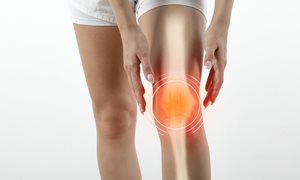31 January 2019
Computer simulation
The research team of the Radboudumc, consisting of Nico Verdonschot, Esther Tanck and PhD candidate Florieke Eggermont, and Yvette van der Linden of the LUMC, developed a patient-specific computer simulation that can predict fracture risk in patients with bone metastases. This computer simulation calculates bone strength based on a CT scan, and appears to be better at estimating fracture risk in comparison to the clinical guidelines. Therefore, they received a grant of €180k from the Innovatiefonds Zorgverzekeraars to initiate clinical implementation of the computer model. The idea is that clinicians can order a computer simulation at the Orthopaedic Research Lab if they are unsure about the patient’s fracture risk. They will then receive a patient-specific fracture risk prediction based on the calculations, which can be used in the consultation with the patient to determine the best treatment option.
Florieke Eggermont, Esther Tanck and Nico Verdonschot are members of theme Reconstructive and regenerative medicine.
 Researchers of the Orthopaedic Research Laboratory of the Radboudumc, together with the LUMC, received a grant of €180k from the Innovatiefonds Zorgverzekeraars for clinical implementation of patient-specific computer models for fracture risk prediction in patients with bone metastases.
Researchers of the Orthopaedic Research Laboratory of the Radboudumc, together with the LUMC, received a grant of €180k from the Innovatiefonds Zorgverzekeraars for clinical implementation of patient-specific computer models for fracture risk prediction in patients with bone metastases.
Computer simulation
The research team of the Radboudumc, consisting of Nico Verdonschot, Esther Tanck and PhD candidate Florieke Eggermont, and Yvette van der Linden of the LUMC, developed a patient-specific computer simulation that can predict fracture risk in patients with bone metastases. This computer simulation calculates bone strength based on a CT scan, and appears to be better at estimating fracture risk in comparison to the clinical guidelines. Therefore, they received a grant of €180k from the Innovatiefonds Zorgverzekeraars to initiate clinical implementation of the computer model. The idea is that clinicians can order a computer simulation at the Orthopaedic Research Lab if they are unsure about the patient’s fracture risk. They will then receive a patient-specific fracture risk prediction based on the calculations, which can be used in the consultation with the patient to determine the best treatment option.
Florieke Eggermont, Esther Tanck and Nico Verdonschot are members of theme Reconstructive and regenerative medicine.
Related news items

Survey of patients to address knee pain from removed meniscus
19 November 2021 Patients with persistent knee pain after meniscus removal can participate at three locations in the Netherlands in the AIR2 study by ATRO Medical, a spin-off of the Radboudumc and DSM. go to page
ATRO Medical, Radboudumc and Samaplast develop new meniscus prosthesis Consortium receives EUROSTARS grant for innovative project
16 July 2020 An international consortium led by ATRO Medical, a spin-off of Radboudumc and DSM, will receive € 800,000 European funding for an innovation aimed at patients with knee osteoarthritis. These patients often suffer from cartilage wear due to a meniscus that no longer works properly. go to page
Phantomless calibration of CT scans for fracture risk assessment in cancer patients with femoral bone metastases
5 September 2019 In Plos One, Florieke Eggermont, Esther Tanck and colleagues developed a calibration method, which makes clinical implementation of CT-based finite element models as tool for fracture risk assessment easier. go to page
Philip van der Wees appointed Professor of Allied Health Sciences
30 May 2018 The focus of the Chair is value-driven allied health care in interdisciplinary networks. go to page
Honorary doctorate in Aalborg for Nico Verdonschot
25 April 2018 Verdonschot has a global reputation in the field of orthopaedic biomechanics. Besides professor in the Radboudumc, he is the scientific director of the TechMed Centre, and professor of Biomechanical Implants at the department of Biomechanical Engineering at the UT. go to page